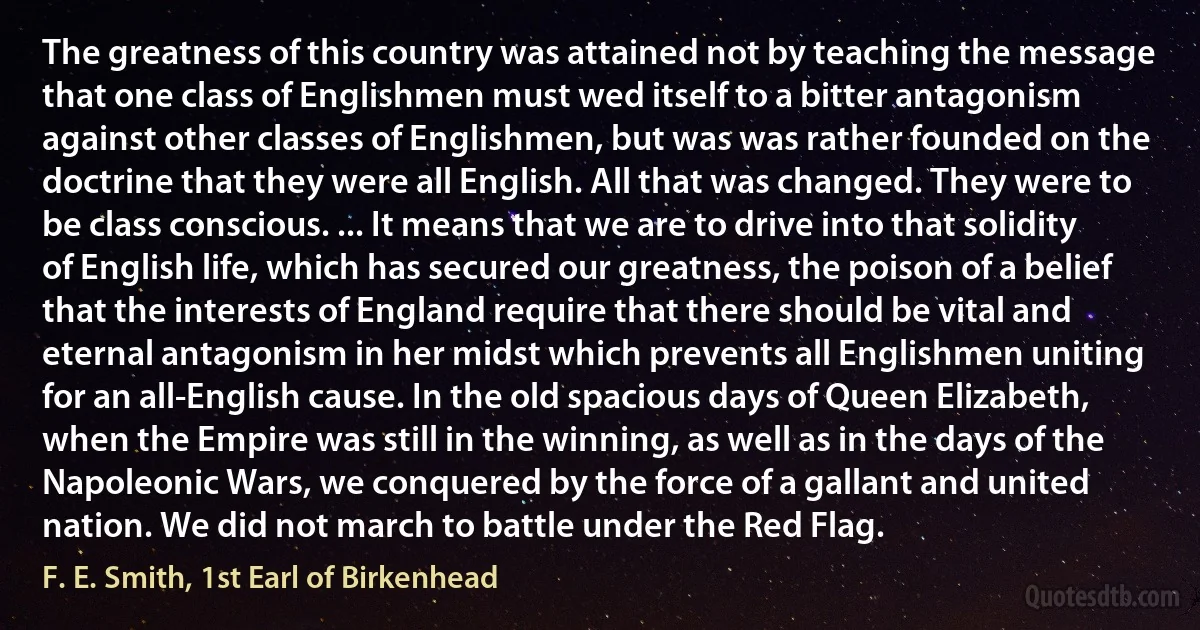
The greatness of this country was attained not by teaching the message that one class of Englishmen must wed itself to a bitter antagonism against other classes of Englishmen, but was was rather founded on the doctrine that they were all English. All that was changed. They were to be class conscious. ... It means that we are to drive into that solidity of English life, which has secured our greatness, the poison of a belief that the interests of England require that there should be vital and eternal antagonism in her midst which prevents all Englishmen uniting for an all-English cause. In the old spacious days of Queen Elizabeth, when the Empire was still in the winning, as well as in the days of the Napoleonic Wars, we conquered by the force of a gallant and united nation. We did not march to battle under the Red Flag.
F. E. Smith, 1st Earl of BirkenheadRelated topics
battle bitter cause country doctrine drive english force greatness life march midst nation poison queen red should solidity teaching under vital well winning means days ElizabethRelated quotes
No sooner was the Baltic open to our merchants, than corn was bought up there for importation into England; at the same time the continent was glutted with English goods, which, because the supply greatly exceeded the demand, were sold at less than their prime cost, and upon which the foreign governments soon laid new duties...to prevent the ruin of their own manufactures. This might have been a salutary lesson, if nations were ever rendered wise by experience; it might have taught us that, however willing one part of this nation might be to see the other ruined by the free admission of foreign grain, foreign governments would never consent to have their fabrics destroyed by the unrestricted introduction of British goods. It is a sound maxim in politics, whatever it may be in morals, that charity begins at home.

Robert Southey
England is the country of the English... England is the stage on which the drama of English history was played and the setting within which the English became conscious of themselves as a people ... when politicians and preachers attempt to frighten and cajole the English into pretending away the distinction between themselves and people of other nations and other origins, they are engaged in undermining the foundation upon which democratic government by consent and peaceable civilised society in this country are supported ... those who at the end of the twentieth century wish to keep alive that consciousness of being English, which seemed so effortless and uncontroversial to our forefathers, will discover that they are called upon, if they take their purpose seriously, to confront the most arrogant and imposing prejudices of their time.

Enoch Powell
But we are not here to applaud manly courage, save as it has been displayed in a noble cause. We must never forget that victory to the rebellion meant death to the republic. We must never forget that the loyal soldiers who rest beneath this sod flung themselves between the nation and the nation's destroyers. If today we have a country not boiling in an agony of blood, like France, if now we have a united country, no longer cursed by the hell-black system of human bondage, if the American name is no longer a by-word and a hissing to a mocking earth, if the star-spangled banner floats only over free American citizens in every quarter of the land, and our country has before it a long and glorious career of justice, liberty, and civilization, we are indebted to the unselfish devotion of the noble army who rest in these honored graves all around us.

Frederick Douglass
Sir, there were other days, when England was the hope of freedom. Wherever in the world a high aspiration was entertained, or a noble blow was struck, it was to England that the eyes of the oppressed were always turned-to this favourite, this darling home of so much privilege and so much happiness, where the people that had built up a noble edifice for themselves would, it was well known, be ready to do what in them lay to secure the benefit of the same inestimable boon for others. You talk to me of the established tradition and policy in regard to Turkey. I appeal to an established tradition, older, wider, nobler far-a tradition not which disregards British interests, but which teaches you to seek the promotion of those interests in obeying the dictates of honour and of justice.

William Ewart Gladstone
The promise of a future life is held to have such prominence in Christ's teaching as to lead Paul to say that the Master "brought life and immortality to light." How did he do this? By filling the life of to-day with the consciousness of eternal things, of truths and principles which would not change if the whole visible universe were to pass away.
No one to-day, I think, will maintain that Christ created the hope which he aroused to an activity before undreamed of. The majority of the Jews believed in a life after death, as is shown by the segregation of the Sadducees from the orthodox of the synagogue. The new teaching vindicated the spiritual rights and interests of man. From the depths of his own heart was evolved the consciousness of a good that could not die. Man, the creature of a day, has a vested interest in things eternal.

Julia Ward Howe
